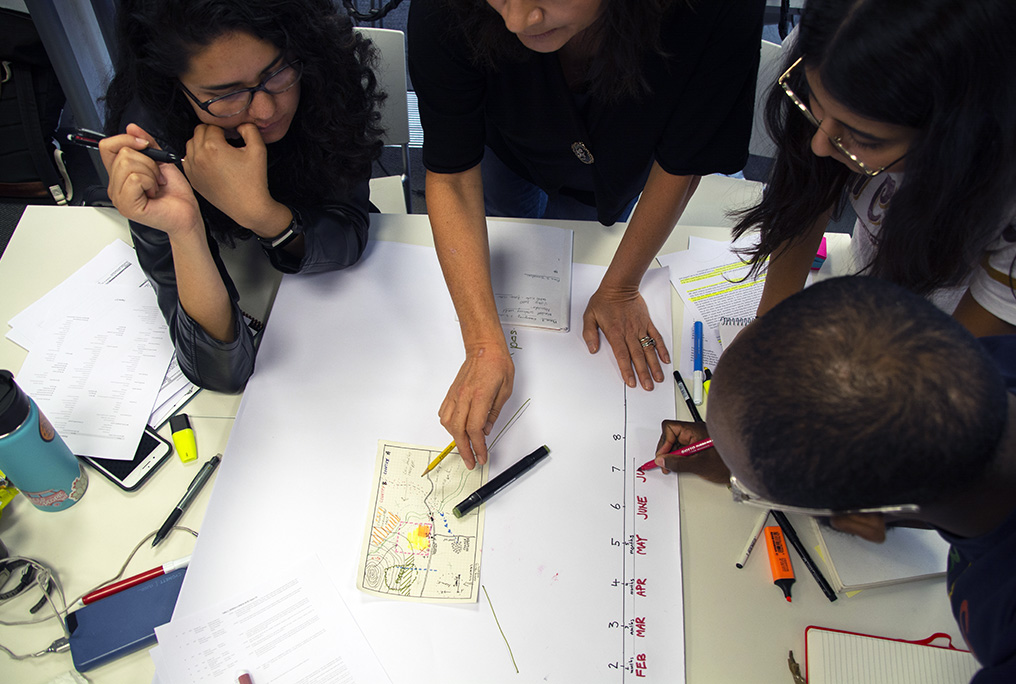In September and October, our students undertook the three-week Humanitarian Shelter & Settlements workshop, offered in partnership with the International Federation of Red Cross and Red Crescent Society (IFRC). The course explores how international agencies respond to displacement crisis for sudden natural disasters and draws upon a team of experts in the field that work for International Relief Institutions.
Emergency situations, resettlement and growth of cities can happen in complex situations and multiple scenarios. The basic needs of a population in a critical situation must be satisfied considering the context, the situation and culture of the inhabitants. Despite the complexity and urgency to meet these basic needs, we must bear in mind that a process of building a settlement is being carried out.
Have a look at our quick recap, photos and key moments of the course:
 Our students with Ian Davis, who has worked in the disaster and development field for over four decades
Our students with Ian Davis, who has worked in the disaster and development field for over four decades
This year, the course began with an introduction to the IFRC Shelter Unit and the larger picture of Emergency Response and program cycle, presented by our director Carmen Mendoza and Marta Peña from IFRC. Our students also had the immense honour to spent some time with Ian Davis, and to look with him at Disaster Recovery.

 Our students drawing the layout of an emergency shelter for a family of 5 and discussing everyday life in it with Daniel Ledesma
Our students drawing the layout of an emergency shelter for a family of 5 and discussing everyday life in it with Daniel Ledesma
With guest teacher Daniel Ledesma, they then delved into the shelter scale, looking at shelter typologies, materials, and design in the three-day module “Research & Development in Emergency Humanitarian Shelter”.
 “Post-Disaster Planning from the Perspective of DRR and Resilience Building” with Ebru Gencer
“Post-Disaster Planning from the Perspective of DRR and Resilience Building” with Ebru Gencer
The second week started with new guest teacher Ebru Gencer from Columbia University and her one-day module “Post-Disaster Planning from the Perspective of DRR and Resilience Building”, providing an overview of the topic of post-disaster planning in the context of disaster risk reduction (DRR) and resilience building through policy and practices at the global stage. In the course, students discussed global policy frameworks – in particular of the Sendai Framework for DRR – that set the stage for nations and cities to undertake post-disaster planning and recovery as part of their DRR and resilience building activities. They also looked at the subject of post-disaster planning in the context of urban planning and urban development through readings, discussions and case studies, in particular with that of Istanbul (Marmara) and Kobe earthquakes in the 1990s.
 All things WASH (Water, Sanitation & Hygiene) with Andreas Schiffer
All things WASH (Water, Sanitation & Hygiene) with Andreas Schiffer
The week continued with Andreas Schiffer of FLASH (Formación en Logística, Agua, Saneamiento e Higiene) and his WASH course on sanitation in humanitarian crises. “Camps, politics, and space: Complexities and Ambiguities of Segregation” was the topic our students explored with Gaja Maestri from Aston University, who also joined our amazing group of guest teachers this year. The course offered an introduction to the complex sociology and geography of ‘camp space’, the main theoretical approaches developed in various social science disciplines as well as considering a series of phenomena linked by segregation.
 “The concept of ‘camp’ is today increasingly crucial to grapple with current social changes in the world’s geographies of exclusion and inclusion” – Gaja Maestri
“The concept of ‘camp’ is today increasingly crucial to grapple with current social changes in the world’s geographies of exclusion and inclusion” – Gaja Maestri
In the last week, Gonzalo Sánchez-Terán (Jesuit Refugee Service International) and Verónica Sánchez Carrera, an independent researcher, covered camp planning and management with our class, as well as medical facilities for health emergencies, getting to a deeper understanding of the complexity of these ‘’permanently temporary’’ environments. Our students discovered how international agencies and humanitarian workers respond to displacement crisis through the design, construction, improvement and management of refugee and IDP camps, and Ebola centres.

 Planning a Refugee Camp – an action-planning scenario-based response undertaken by working groups
Planning a Refugee Camp – an action-planning scenario-based response undertaken by working groups

 Understanding the context and dynamics of sudden displacement and the role of architecture in the overall humanitarian activities – with Verónica Sánchez and Gonzalo Sánchez-Terán
Understanding the context and dynamics of sudden displacement and the role of architecture in the overall humanitarian activities – with Verónica Sánchez and Gonzalo Sánchez-Terán
If you are interested in participating in the next edition of our IFRC certified Humanitarian Shelter and Settlements course, please refer to our website for more information. The course is aimed at persons involved in relevant fields as well as those who would like to work in post-disaster and post-conflict recovery and reconstruction.
Images: Courtesy of Prachi Metawala @place_displaced, her classmates and our guest teachers

